
12 minute read
Preventing falls at home
Incorporating movement into your every day activities will improve your long term health.
OLDER ADULTS
For older Australians, the loss of mobility has a significant impact on our ability to do the things we need and want to do every day.
Many people may benefit from treatment and interventions to maintain strength. Gentler exercises including exercise in water (hydrotherapy), walking, or even repeated sitting and standing from a chair with a small weight can help maintain strength.
Most people want to remain in their home for as long as possible and often the key to this is maintaining the ability to move around the home safely. There are many assistive mobility devices that can help with this, including walking sticks, walkers, motorised scooters, handles for the car door or swivelling pads for the car seat.
Many older Australians experience a decline in eyesight, which can also significantly impact their ability to move around safely, judge distance and depth or drive. Regular examinations for eye health and review of optical prescription can increase confidence in moving around, especially at night.
For more information about mobility at different stages of life visit nationalpharmacies.com.au
References
1. https://raisingchildren.net. au/newborns/play-learning/ play-ideas/movement-playnewborns
2. https://www.dkfindout.com/ us/human-body/life-cycle/ changing-proportions/
3. https://raisingchildren.net. au/newborns/health-dailycare/holding-newborns/howto-hold-your-newborn
4. https://www.kidsnews. com.au/health/familiesencouraged-to-head-outdoorsfor-playlight-savings/news-sto ry/86f3edc5770100b675d9b709 a618da9a
5. https://www.aihw.gov.au/ reports/australias-health/ overweight-and-obesity
Focus On: Glenelg
National Pharmacies Store
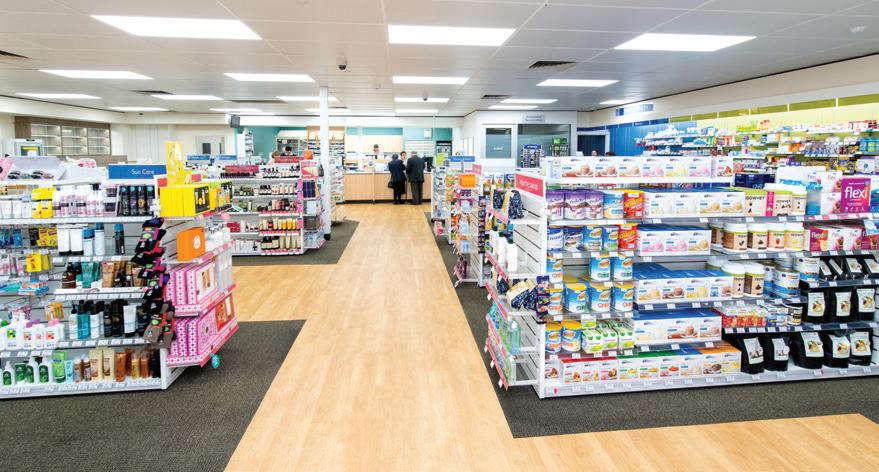


Nestled on the bustling Jetty Road in Glenelg, National Pharmacies Glenelg is well-known amongst locals for its large beauty and skincare range and expert health advice. With experts in Mobility, Naturopathy and Sleep on staff, the team at National Pharmacies Glenelg are available for all health and wellbeing needs.
Ana Acic
Pharmacy Operations Manager, Ana, loves working at the Glenelg pharmacy. “We have a great team at Glenelg. Our customers are great, we get a wide variety of people coming through our doors”.
“At Glenelg we offer our customers a wide range of mobility aids such as Making Life Easy products, including crutches and shower stools. Our store also offers Sleep Apnoea consultations, Naturopathy, Vaccinations, and other services such as Sick Leave Certificates and MedChecks. Beauty services, including make-up and facials by our qualified consultants”.
MEET OUR NATUROPATH
Craig Wainwright

We all know how important it is to stay mobile as we age. National Pharmacies Glenelg resident Naturopath, Craig, shared with us his advice for keeping on the go as we age.
What are the most common mobility concerns that you see in your patients? I deal with a lot of osteoarthritis and general stiffness, pain and inflammation; whether it is knees or lower back. Also, a lot of injury recovery, from sports injuries to broken bones and falls.
What are some preventative ways to stay active and keep mobile? Be active! Especially older people. We need to be as active as we can with daily tasks, because once you stop being active, the older we are, the harder it gets, and the more immobile we become. So, use it or lose it. That applies to all of us.
How can a Naturopath assist with mobility concerns? In assessments with people I will often make referrals to other allied health specialists. I am here to help, advise or advocate for people. One thing I try and do is be aware of other options. For people with mobility concerns or injuries, I am an advocate for people trying ultrasound therapy (devices for which you can purchase at National Pharmacies). Sometimes I also recommend laser therapy or hot and cold therapy. I try and be broad so that in a way you give people other options. Do you think diet is also important? Yes, it is massively important. Diet is such a big determination of generalised overall inflammation. The amount of clients who are sore, stiff achy, and often it is just because of high processed food diets, high carbohydrate, processed fats or too much sugar. People don’t realise how much difference this can make, and there are also many things you can include in diet that can reduce this, as well as supplements. Lots of people get diagnosed with osteoarthritis or are stiff and achy because of a very poor diet. Craig is both a qualified Naturopath and Pharmacist practising Naturopathy since 2007. Craig became a pharmacist in 1989 and his passion for helping people with their health quickly developed into an interest in complementary medicine and a strong focus on healing the person, not just the disease.
To book a Naturopath appointment with Craig, head to our website at nationalpharmacies.com.au
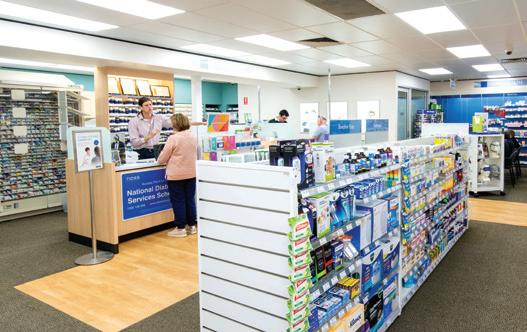
Ask Our Expert
National Pharmacies Podiatrist, Sara Jenzen answers your questions about Podiatry.
I think I have bunions what should I do? Bunions are typically characterised by a bony bump on the side of the foot over the base joint of the big or little toe. The “bump” occurs as the affected toe angles across to the lesser toes. Often the movement of the bones and joints causes shoe fitting issues and commonly becomes inflamed with shoe pressure. Sometimes, the joint becomes arthritic resulting in pain and balance issues. Bunions themselves aren’t inherited, but the foot characteristics that cause bunions often are. If you are concerned about developing bunions, or they "run in your family", then it might be worthwhile seeing a podiatrist where the alignment and biomechanics of your feet can be assessed, and steps taken to reduce the effects of a bunion. This may include: • Footwear advice • Shields to protect your bunion from pressure • Orthotic therapy to reduce the forces through the joints and improve alignment and function of the foot The best advice is to seek help early from a podiatrist if you are concerned about bunions.
My feet often hurt after I have been walking a lot or standing all day. Is this normal or should I see a podiatrist? No this is not normal, but very common. There are numerous reasons why your feet could be hurting after being on them for long periods. It could be as simple as ill-fitting footwear or the incorrect footwear for the activity. Other causes could include poor posture or biomechanics of your feet or more serious issues such as problems with circulation. If you do experience pain and it is affecting your mobility, it is advised to have your feet checked by a podiatrist as early diagnosis and intervention is often best.
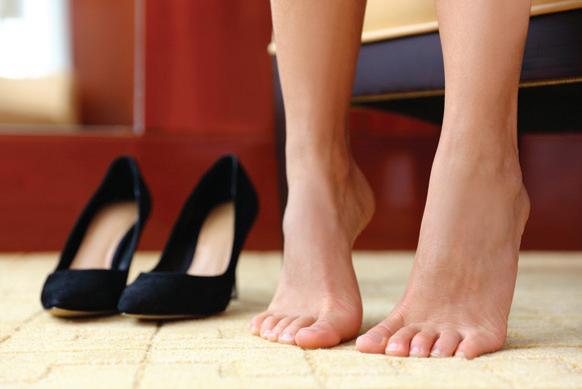
I have diabetes, I know I should keep an eye on my feet, but what does this mean? Literally that! Regularly look at your feet or have someone (a podiatrist) do it for you. Uncontrolled diabetes can have a detrimental effect on the nerves and blood vessels of the feet which in turn can have very serious consequences. Podiatrists are trained to assess the nerve and blood vessel function in your feet and identify and treat any areas of concern and monitor those that could cause issues in the future. Prevention is better than cure and a regular appointment with a podiatrist is paramount in maintaining foot health and mobility in diabetics.
How do I know if I need orthotics? Painful, tired and aching feet are often a sign that your feet aren’t functioning correctly, and that orthotics may be needed. Other signs include ankle, knee, hip and lower back pain. Unusual wear patterns on shoes are often a clue. Place your shoe on a bench and see if it is distorted in any way. If so, it may indicate
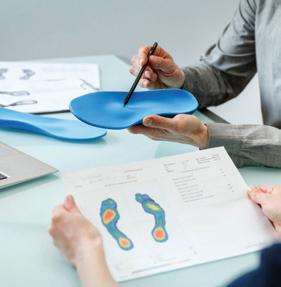
that your foot is rolling inwards or outwards. Additionally, turning the shoe over and finding uneven wear patterns on the sole can indicate incorrect foot biomechanics. The recommended way to know if orthotics can help you is to make an appointment with a podiatrist where you can discuss any concerns and have your feet professionally assessed.
I have never seen a podiatrist, should I be booking an appointment? Podiatrists treat a large range of disorders affecting the feet and lower limb including (but not limited to) ingrown toenails, heel pain, cracked heels, corns and calluses, nail care, flat feet, orthotics, children’s feet and diabetes care. No matter the concern, large or small, if it concerns the feet or lower limb, then a podiatrist can help or at least point you in the right direction to get help.
What happens in an appointment with a podiatrist? During your appointment, you will be asked about the history of your complaint and general health. The podiatrist will then do a thorough assessment and determine an appropriate treatment plan. In the case of routine care including nails, corns, callus, dry skin etc you can often be treated there and then and walk out pain free. If orthotics are required, or an injury is being treated, then further appointments may be necessary. Podiatrists regularly refer to and work together with other health professionals to maximise your treatment outcomes.
To book a Podiatrist appointment with Sara, head to our website at nationalpharmacies.com.au
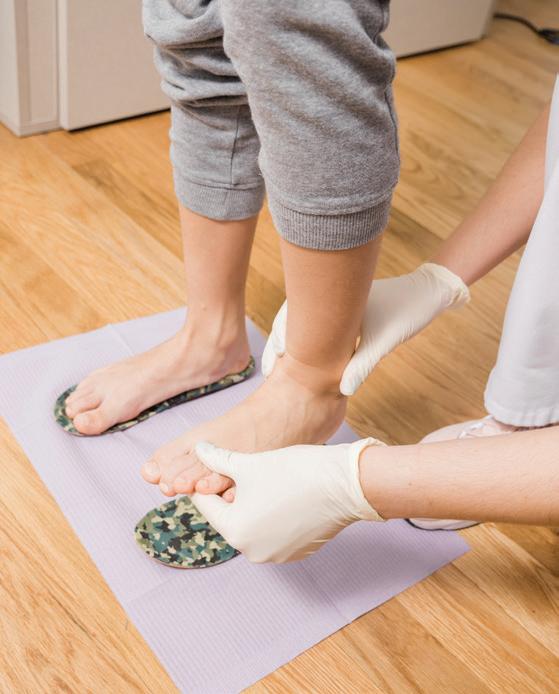
The information provided here should not be used in lieu of speaking with a healthcare professional. If you're experiencing symptoms visit your GP or local National Pharmacies Pharmacist or Podiatrist.
OPTICAL
The link between Vision and Mobility.
The way we perceive the world through our eyes is vital for us to achieve the best possible mobility.
By Optometrist, Cameron Girgenti
Research has indicated that visually impaired people have slower walking speeds, poorer balance, experience more falls and report greater mobility difficulty than non-visually impaired people¹.
The most common type of visual impairment is refractive error, which is a problem with the eye's focusing ability and the most common reason why a person requires a pair of spectacles for clear vision. Another common cause of visual impairment is cataract, which is when the natural lens within the eye becomes cloudy and causes the vision to become correspondingly cloudy. Less common but more serious causes of visual impairment include macular degeneration and glaucoma. These conditions can result in visual field defects, which is when part of the visual field is reduced or missing. Macular degeneration typically affects the central vision and glaucoma affects the peripheral vision.
A regular eye examination with an Optometrist is the single most important thing that we can do to maintain good vision. Often the simplest solution to visual impairment is a pair of glasses or contact lenses to correct refractive error, although medication or surgical intervention may be required depending on the condition. Visual impairment isn't always irreversible, which highlights the importance of regular eye examinations to help prevent damage before it's too late. We can also keep our eyes healthy by protecting them from the sun with sunglasses and a hat and consuming a balanced diet including dark green leafy vegetables, fish, fruit, and nuts. Smoking should be avoided as it increases the risk of cataract, glaucoma and macular degeneration².

Our vision is important to us for many reasons and at all stages of our life. Staying on top of our eye health at a younger age gives us the best chance of preserving this precious sense for many years. Are you due for your next eye examination? References
1. Swenor BK, Munoz B, West SK. Does visual impairment affect mobility over time? The Salisbury Eye Evaluation Study. Invest Ophthalmol Vis Sci. 2013; 54(12): 7683-7690.
2. Cheng ACK, Pang CP, Leung ATS, Chua JKH, Fan DSP, Lam DSC. The association between cigarette smoking and ocular diseases. HKMJ. 2000; 6: 195-202.

Seeing sport clearly
Where sport is involved, you need the right tools to get the score up and the job done – and that includes having the right eyewear to help you see clearly and stay safe.
Whether it’s the amateur league or champions league, Miniroos or Matildas, first-time swim lessons or a personal best lap of the pool, having clear vision is one of the most underrated advantages any sports person can have.
For centuries, athletes were only as good as their vision. Now with specifically designed eyewear to not only protect our eyes from sports-related injuries, but enhance vision and mobility, athletes from all walks of life are seen with eyewear to suit their sport. With eyewear in sports becoming more common, the risk of eye damage is reduced while the athlete’s performance is enhanced; meaning there’s less time on the bench and more time to get swinging, kicking, throwing, and enjoying sport! Wearing protective eyewear creates a clear, sharp vision for performance and can also help with outdoor activity like running or cycling, especially when it rains or the sun shines bright.
For some of us, it’s not as much about protecting our eyes during sport, but allowing us to see clearly while exercising or competing. Specially designed sports sunglasses from brands such as Bolle and Oakley can be prescribed especially to your needs not only protecting your eyes from the sun, but also allowing you to see clearly while cycling, running, fishing, playing golf or tennis. Prescription swimming goggles or dive masks are allowing swimmers and divers everywhere to see clearly underwater. Designed to be comfortable with high impact resistant materials and to fit to your face, so you can focus more on getting to the end of the pool, and less on adjusting your eyewear.
Whether you’re looking to protect your eyes during sport, or you require prescription lenses while being active, Optical by National Pharmacies, has the right eyewear for your sports and vision needs. Carrying a range of swimming goggles and dive masks, sports sunglasses and contact lenses to suit your prescription, you’ll be seeing clearly and playing well in no time.





